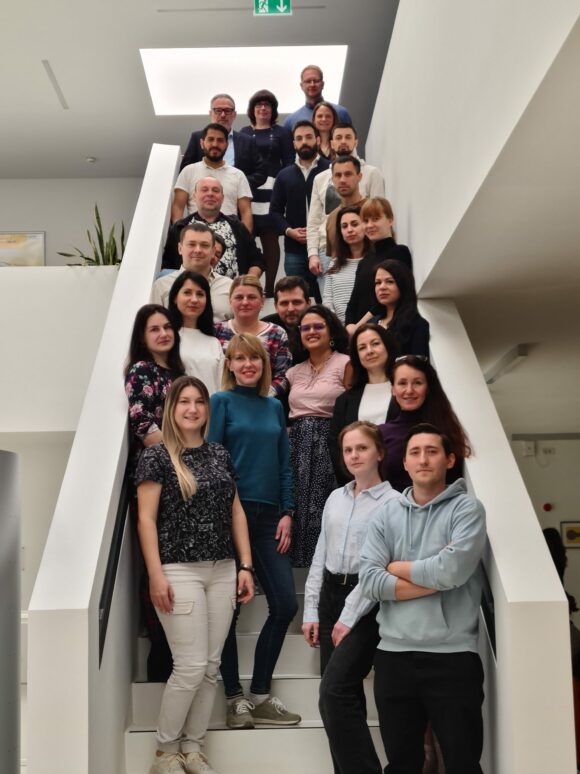The email inbox is overflowing, the laundry is piling up at home, you have to study for the exam and the one or other unpleasant conversation also wants to be held? But instead of finally tackling things consistently, you’d rather check your news on Instagram or watch your favorite show on Netflix? You are not alone in this, on the contrary: the phenomenon even has a scientific name and is very widespread: “procrastination” is the name given to what prevents us from consistently getting started on our tasks. How to counter “procrastination” is now explained in a course for students at Hof University of Applied Sciences. Lecturer Prof. Dr. Cynthia Sende gives very practical tips for personal behavioral change.

Procrastination – the term comes from the Latin “procrastinare”, which means “to put off” or simply “to put off until tomorrow” – is a widespread phenomenon that is by no means to be equated with a pure lack of discipline. What is meant is rather that upcoming professional or private duties are postponed as far as possible by means of skip actions and substitute activities. Procrastinators, for example, prefer to clean the apartment before working on the tax return or attending the doctor’s appointment.
Poorer grades due to more time stress
Procrastination can also quickly become a problem, especially in college, for example when exams are postponed or homework is done “at the last minute:
We know from surveys among our students: Especially at the beginning of studies, learning strategies and the right time management are often missing. As a result, students experience more stress, not infrequently their exam results deteriorate, and test anxiety continues to increase.”
Prof. Dr. Cynthia Sende
Particularly during the Corona period, these problems had increasingly intensified, according to the professor of business psychology, who also had many conversations with her colleagues about this in the past. Surveys of Hof students showed that around half have a medium to high level of procrastination. Some national and international studies even speak of 70 to 90 percent of all students procrastinating. “It is also not uncommon for students to regret not having addressed the issue of time management at an early stage,” says Prof. Dr. Sende.
Help for self-help
Reason enough to offer in the future to the studying of the university yard immediately completely practical assistance: After a pilot training in the subject economics psychology in the last summer semester, now a training divided into two blocks is open to all studying in the first to the third semester, in order to improve the own self management: We work thereby particularly also with beginnings and exercises from the cognitive behavior therapy – finally it is usually unpleasant tasks, which are occupied with particularly negative emotions, which one prefers to avoid. These emotions and thoughts have to be discussed and worked on – also with other people concerned,” says the lecturer.

Work with rewards
But what does that mean in concrete terms – how can you get yourself to do your tasks in a very practical way?
The goal must always be to start earlier with everything in order to have the good feeling as soon as possible that something has already been done. You can work on this with a personal reward system, for example.”
Prof. Dr. Cynthia Sende
What is perceived as a reward can be very individual: “For one person, it’s the tick on a completed to-do list, for another it’s the weekend excursion that they otherwise wouldn’t be able to afford – that’s very different.” The problem, however, is that rewards in the form of a performance evaluation often come too late to change behavior in the long term: “In addition, it is problematic that substitute actions can also have positive consequences and satisfy, while the negative consequences of procrastination only come to light later.”
Strengthen social control
That’s why it’s also helpful in college to strengthen social control, he said. “Forming study groups that set common goals or deadlines is a very effective way to combat personal procrastination,” advises Prof. Dr. Sende. This is often the best way to support each other, break down behavioral barriers, “debunk” one’s own excuses and get ideas from others. Because: “It is always helpful to learn from good students in higher semesters. We also promote this exchange in a targeted manner. In addition, we teach students to set controllable behavioral goals – such as practicing XY for an hour every Wednesday – instead of setting goals for results, e.g., this or that grade in subject XY. While outcome goals are more likely to lead to frustration, behavioral goals can lead to a sense of accomplishment while still acting.
Prioritizing tasks correctly and avoiding distractions is also an important issue, he says: “The emotional release is highest after completing the most difficult task, so even smaller demands eventually become much easier to handle. I have always found this to be enormously motivating personally as well,” the lecturer concludes.
Registration for students at Hof University
For the training “Deadline-Dompteur” – Proactively against Prokrastination” students of the first to third semester can register in Moodle.
- First register without obligation in the Moodle course “Self-management training Deadline Dompteur”
- There are the five date options (rooms to be announced).
- At the end of October/beginning of November, participate in the online pre-survey (anonymously) and sign up for a training date without obligation.
- The first part (3h) of the training will take place in November, the second part (3h) in December.
- Post-survey (online and anonymous) in January







